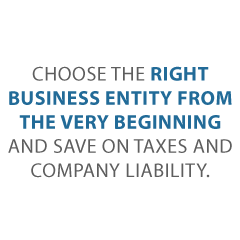Did You Know that Choosing the Right Entity Can Save You?
Business entities can seem confusing. Choose the right business entity from the very beginning and save on taxes and company liability. Choosing the right entity can save you!
First, here are the more common business entities.
Choosing the Right Entity: Types of Business Entities
Sole Proprietorship
The SBA says a sole proprietorship is an unincorporated business owned and run by just one person. There is no difference between the owner and the business. That means you, the owner, get all of profits. But you are also responsible for all your business’s losses, debts, and liabilities.
Partnership
The SBA defines a partnership as a single business with two or more owners. Partnerships then divide into three types.
General Partnership
General partnerships assume the partners equally divide up all of the liability, profits, and management duties. But what if you want an unequal distribution? Then the percentages for each partner must be documented in the partnership agreement.
Limited Partnership
So this is also referred to a partnership with limited liability. These are more complex than general partnerships. A limited partnership means the partners have limited liability. But they also have limited input in management decisions. What a limit will be will depend on each partner’s investment percentage. Therefore, limited partnerships can be attractive to investors in short-term projects.
Joint Venture
Joint ventures work like a general partnership. But this is only a specific period of time or for a single project.
Partners in a joint venture can convert it to an ongoing partnership if they continue the venture. But they must file that way. So this is often with the IRS and the applicable Secretary of State.
Corporation
A corporation (also called a C corporation) exists as an independent legal entity. So its shareholders own it. So the corporation itself, and not the shareholders who own it, can be held legally liable. This is for actions and debts which the business incurs.
S Corporation (sometimes called a Subchapter S Corporation)
An S corporation works as a special type of corporation created by an IRS tax election. So this is the IRS’s Subchapter S designation. An eligible domestic corporations can avoid double taxes if they opt to be treated as S corporations. These double taxes are once to the corporation and again to the shareholders.
In an S Corporation, profits and losses can pass through to your personal tax return. The business itself is not subject to taxes. Only shareholders are subject to taxes. But any shareholder employees must pay themselves reasonable compensation. The shareholder has to get fair market value. Or else the Internal Revenue Service could reclassify additional corporate earnings as wages.
Limited Liability Company
A limited liability company exists as a type of hybrid legal structure. It has the limited liability features of a corporation. But it has the tax efficiencies and operational flexibility which partnerships enjoy. The owners of an LLC are called members. Depending on the state, members can be one person (that is, one owner. Or they can be two or more people, corporations, or even other LLCs.
Unlike corporate shareholders, LLCs are not subject to taxes as a separate business entity. Instead, all profits and losses pass through the business to each member of the LLC. Then LLC members report all the profits and losses on their personal federal tax returns. This is just like the owners of a partnership would.
There are two great reasons why it matters which business entity you choose. This is how the right entity can save you.
https://creditsuite.wistia.com/medias/94z8msbn94?embedType=async&videoFoam=true&videoWidth=640
Choosing the Right Entity: Taxes
Here are the specifics:
Sole Proprietorships
Sole proprietorships – since the single owner and the sole proprietorship are the same; the owner pays taxes on the sole proprietorship’s profits.
Partnerships
Partnerships – The partnership does not pay income tax. Instead, the business passes its profits or losses to its partners. Then the partners include their respective share of partnership income or loss on their personal tax returns.
Corporations
Corporations – Corporations pay state and federal taxes. And they sometimes also pay local taxes. This includes income taxes on profits. A corporation can be subject to taxes two separate times. So this is first when a corporation makes a profit. And the second when dividends go to the shareholders.
S Corporations
S Corporations – an S corporation is often a smart choice for tax savings purposes. LLC members must pay an employment tax on the whole net income of the business. But only the wages of an S corporation shareholder who is an employee are subject to employment tax.
Any other income goes to the owner as a distribution. Distributions are subject to taxes at a lower rate, if at all.
Limited Liability Corporations
Limited Liability Corporations – an LLC is not a separate entity according to the IRS, so it does not pay taxes. Instead, the members are individually subject to taxes.
Legal Liability
Legal liability varies:
Choosing the Right Entity: Sole Proprietorships
Sole proprietorships – there are no limits on personal liability. If the sole proprietorship did it, then so did its owner. You are responsible for all debts and obligations. And these include any risks from the actions of employees.
Partnerships
Partnerships – Partnership owners have full, shared liability. Hence partners are liable for their own actions. And they are liable for any business debts and decisions made by the other partners. Furthermore, the partnership’s debts can be satisfied with all of the partners’ personal assets.
Corporations
Corporations – In a corporation, shareholders’ personal assets have protection. Shareholders are usually just held accountable for their investment in company stock.
S Corporations
S Corporations – An S corporation shareholder’s personal assets, like their personal bank accounts, cannot be used to satisfy any business liabilities. Hence these include verdicts against the company.
Limited Liability Corporations
LLC – LLC members are protected from personal liability for business decisions or actions of the LLC. If the LLC incurs debt or it is on the receiving end of a lawsuit, members’ personal assets are usually exempt. But not always. Hence the term ‘’limited liability’.
Choosing the Right Entity: Building Business Credit
Did you know corporations are best for building business credit? So even if you have a sole proprietorship, you should still be looking to incorporate.
This is credit in a business’s name. It doesn’t attach to an owner’s consumer credit, not even when the owner is a sole proprietor and the only employee of the business.
Therefore, a business owner’s business and consumer credit scores can be very different.
Choosing the Right Entity: Dealing with the IRS
Visit the IRS website and get an EIN for the business. Here’s where choosing the right business entity like corporation will save you.
A small business can begin as a sole proprietor. But they should switch to a kind of corporation or an LLC.
Sole Proprietors Take Note
If you run a company as a sole proprietor, then at the very least be sure to file for a DBA. This is ‘doing business as’ status.
If you do not, then your personal name is the same as the company name. Therefore, you can find yourself being personally responsible for all business financial obligations.
But never look at a DBA filing as ever being anything beyond a stepping stone to incorporation.
Choosing the Right Entity: A Word about Building Business Credit
Always use credit sensibly! Never borrow more than what you can pay off. Track balances and deadlines for repayments. Paying off in a timely manner and completely will do more to increase business credit scores than just about anything else.
Building business credit pays. Great business credit scores help a business get loans. Your lender knows the business can pay its financial obligations. They understand the company is authentic.
The business’s EIN connects to high scores and credit issuers won’t feel the need to request a personal guarantee.
Business credit is an asset which can help your small business for years to come.
Choosing the Right Entity: Takeaways
Which business entity should you go for?
It is your decision to make. Pay close attention to the tax burden and personal liability as they can affect you. So this is particularly if you have a business with known hazards, like carpentry or exterminating.
You might also want to consider how much control you want to have over your business. A sole proprietorship means you call all the shots. But it also means you are responsible for everything. That can be too much to handle. If it is, then consider one of the other common business entities for a small business.

